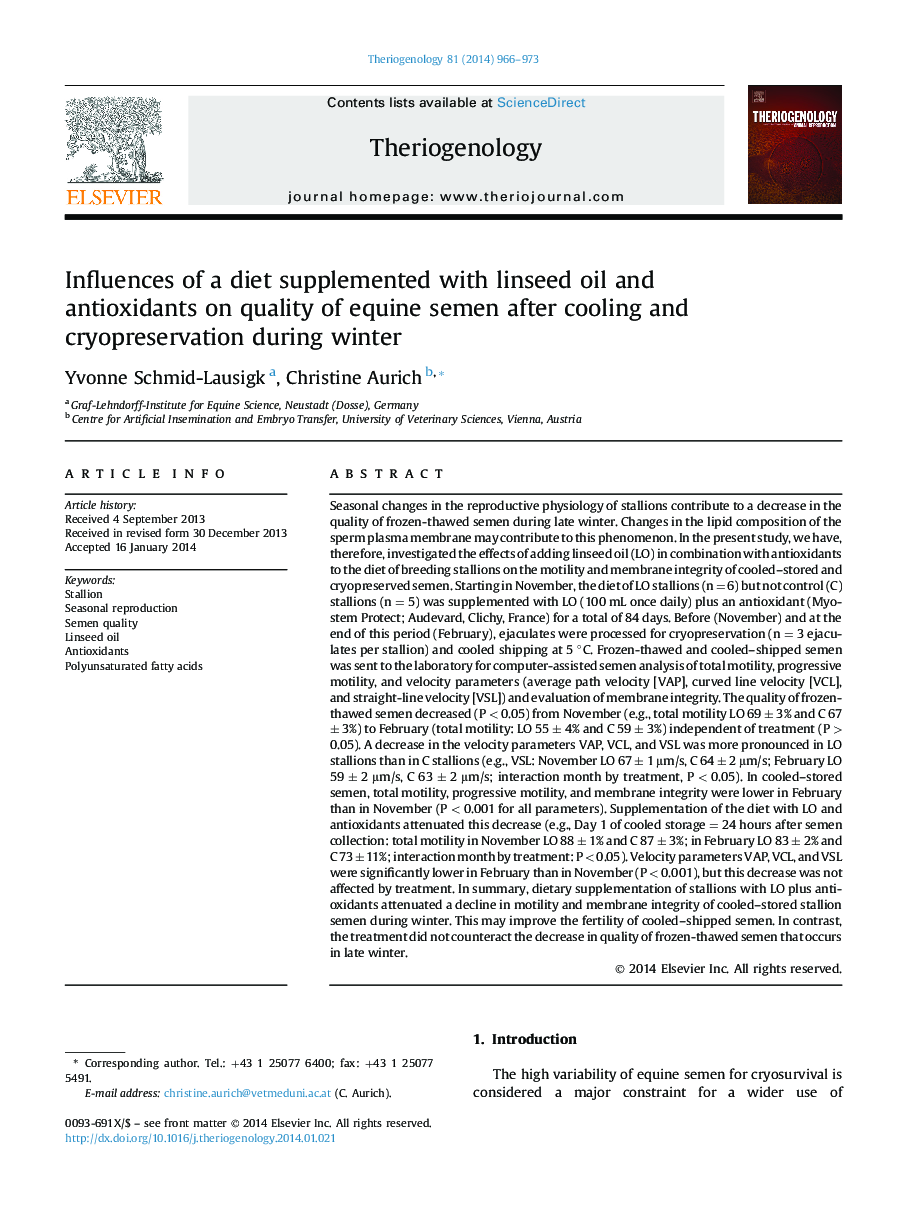| کد مقاله | کد نشریه | سال انتشار | مقاله انگلیسی | نسخه تمام متن |
|---|---|---|---|---|
| 2095149 | 1082077 | 2014 | 8 صفحه PDF | دانلود رایگان |
Seasonal changes in the reproductive physiology of stallions contribute to a decrease in the quality of frozen-thawed semen during late winter. Changes in the lipid composition of the sperm plasma membrane may contribute to this phenomenon. In the present study, we have, therefore, investigated the effects of adding linseed oil (LO) in combination with antioxidants to the diet of breeding stallions on the motility and membrane integrity of cooled–stored and cryopreserved semen. Starting in November, the diet of LO stallions (n = 6) but not control (C) stallions (n = 5) was supplemented with LO (100 mL once daily) plus an antioxidant (Myostem Protect; Audevard, Clichy, France) for a total of 84 days. Before (November) and at the end of this period (February), ejaculates were processed for cryopreservation (n = 3 ejaculates per stallion) and cooled shipping at 5 °C. Frozen-thawed and cooled–shipped semen was sent to the laboratory for computer-assisted semen analysis of total motility, progressive motility, and velocity parameters (average path velocity [VAP], curved line velocity [VCL], and straight-line velocity [VSL]) and evaluation of membrane integrity. The quality of frozen-thawed semen decreased (P < 0.05) from November (e.g., total motility LO 69 ± 3% and C 67 ± 3%) to February (total motility: LO 55 ± 4% and C 59 ± 3%) independent of treatment (P > 0.05). A decrease in the velocity parameters VAP, VCL, and VSL was more pronounced in LO stallions than in C stallions (e.g., VSL: November LO 67 ± 1 μm/s, C 64 ± 2 μm/s; February LO 59 ± 2 μm/s, C 63 ± 2 μm/s; interaction month by treatment, P < 0.05). In cooled–stored semen, total motility, progressive motility, and membrane integrity were lower in February than in November (P < 0.001 for all parameters). Supplementation of the diet with LO and antioxidants attenuated this decrease (e.g., Day 1 of cooled storage = 24 hours after semen collection: total motility in November LO 88 ± 1% and C 87 ± 3%; in February LO 83 ± 2% and C 73 ± 11%; interaction month by treatment: P < 0.05). Velocity parameters VAP, VCL, and VSL were significantly lower in February than in November (P < 0.001), but this decrease was not affected by treatment. In summary, dietary supplementation of stallions with LO plus antioxidants attenuated a decline in motility and membrane integrity of cooled–stored stallion semen during winter. This may improve the fertility of cooled–shipped semen. In contrast, the treatment did not counteract the decrease in quality of frozen-thawed semen that occurs in late winter.
Journal: Theriogenology - Volume 81, Issue 7, 15 April 2014, Pages 966–973
